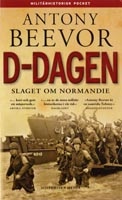When I scourge the pocketbook shops at airports I end up with something involving Hitler too often for it to be a mere coincidence. Given that Adolf was active between 1933 and 1945, either his presence on the bookshelves is way out of proportion to his slice of human history, or I'm some kind of subconsciously controlled Nazi drone.

D-Dagen - Slaget om Normandie
Antony Beevor
ISBN: 9789186297664
Historiska Media, 2011
Swedish
History is just one thing after another, and this book is just like that. (1/5)
I am leaning toward the former. A brief scan of history magazines shows that it is impossible to pick up such a magazine and not read about Hitler in some shape or form. I thought I had managed it when one magazine boasted on the cover that it contained a big article about the American South during the American Civil War. Still racist-oriented reading, I'll admit, but at least it wasn't Hitler. I took the magazine and sat down to read it over a cup of coffee. Then I saw it on the magazine cover, top left below the title: "The Spy That Fooled Hitler".
Damn.
What does that have to do with this book? Well, I'm trying to illustrate that it is possible to get too much of World War II. The greatest global conflict in history is interesting, but after a while one has exhausted even that source of topics.
When I reviewed Antony Beevor's The Battle for Spain, I wrote that:
The Battle for Spain sometimes edges very close to losing the narrative in lists of regiments, but is saved by Beevor's summaries and explanations. The introductory chapter is one of the best I've read in a history book. It should be noted that it is when Beevor stops listing known facts and starts talking about the unanswered questions that he is at his very best.
D-Day. The Battle for Normandy has no such redeeming qualities, and plunges headlong into giving the reader a good insight in the repetitiveness of warfare. Some regiment or unit - Beevor uses their full names and not just the numbers - fights some other regiment or unit, the Americans are gung-ho, the British traditional, the French stroppy and the Germans fanatical. Basically you walk away from the book knowing that there was one big fight in northern France in August, 1944 - but not really much more, unless you are into memorizing military unit names.
The grand sweeps and overviews that lifted The Battle for Spain above mere nerdery and gave the book a feel of not just listing events, but of an attempt to understand the conflict where the author cautiosly proceeds through the historical record, at every step having to carefully consider how events fit together. It was when Beevor hit the limit of his knowledge and had to explain his thinking that the book was at its most brilliant - because even if one doesn't agree with his conclusions, he is clearly an intelligent, thinking, reasoning man.
Which makes D-Day that much more of a disappointment. Things just happen, one after another, and while Beevor manages to make the battle scenes appear frighteningly real, it is a festival of horrors that fail to be more than just that.